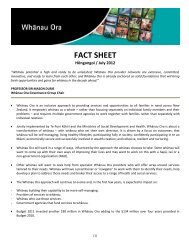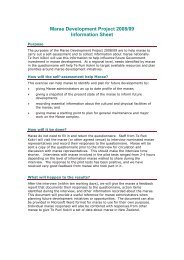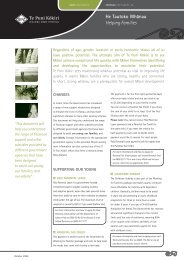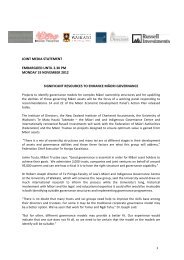Measuring performance and effectiveness for Mäori ... - Te Puni Kokiri
Measuring performance and effectiveness for Mäori ... - Te Puni Kokiri
Measuring performance and effectiveness for Mäori ... - Te Puni Kokiri
You also want an ePaper? Increase the reach of your titles
YUMPU automatically turns print PDFs into web optimized ePapers that Google loves.
PART 5: KEY IMPLEMENTATION ISSUES FOR<br />
MEASURING PERFORMANCE FOR MÄORI<br />
5.1 GOOD QUALITY DATA AND<br />
ROBUST DATA ANALYSIS<br />
The availability of reliable data will be a<br />
key challenge <strong>for</strong> agencies in carrying out<br />
<strong>per<strong>for</strong>mance</strong> measurement by ethnicity (Durie<br />
et al, 2012; Ringold, 2005).<br />
Ethnicity data<br />
The fluid nature of ethnicity poses one of the<br />
main challenges. People in New Zeal<strong>and</strong>, as<br />
in other countries, may change the ways in<br />
which they identify themselves over time, or<br />
they may identify themselves differently in<br />
different environments, such as at work <strong>and</strong> at<br />
home (Statistics New Zeal<strong>and</strong>, 2005).<br />
Ethnicity data is based on self-identification,<br />
but that self-identification, <strong>for</strong> a variety of<br />
reasons, is not always possible. When selfidentification<br />
is not possible, proxy responses<br />
are often collected. This creates inaccuracies<br />
because in these cases the individual has<br />
their ethnicity identified by a third party<br />
on their behalf, based on the third party’s<br />
perception of the individual’s ethnic identity.<br />
Nonetheless, agencies are expected to comply<br />
with Statistics New Zeal<strong>and</strong>’s classification<br />
st<strong>and</strong>ards on ethnicity.<br />
Kukutai (2004) suggests agencies ought<br />
to be more <strong>for</strong>thcoming on how Mäori is<br />
defined, <strong>and</strong> the assumptions about why <strong>and</strong><br />
how it is deployed. There are guidelines <strong>for</strong><br />
the state sector on how to use the non-<br />
Mäori group in ethnicity statistics (Statistics<br />
New Zeal<strong>and</strong>, 2005).<br />
Many mainstream services would benefit from<br />
Mäori-inclusive evaluations (Thomas, 2002),<br />
which would provide in<strong>for</strong>mation that in<strong>for</strong>ms<br />
improvement. There would also be benefit<br />
in agencies sharing data sets <strong>and</strong> the results<br />
of evaluations to build an evidence base<br />
about progress towards desired longer term<br />
outcomes (State Services Commission, 2011b).<br />
5.2 ORGANISATIONS NEED THE<br />
RIGHT CAPABILITY<br />
In order to maintain ethnicity data quality,<br />
agencies need the right leadership, <strong>and</strong> technical<br />
<strong>and</strong> policy expertise to drive dem<strong>and</strong> <strong>for</strong> it.<br />
Leadership<br />
When agencies set ethnicity targets they<br />
need to be supported by a champion at senior<br />
management level (The Treasury, 2004, 2006).<br />
Mäori under-represented in key<br />
public sector roles<br />
One of the main themes that emerges from<br />
the literature is the under-representation of<br />
Mäori in the public service in many influential<br />
roles: chief executive; senior management;<br />
middle management; policy; professional; <strong>and</strong><br />
technical roles (State Services Commission,<br />
2003a, 2010a, 2010c, 2011c; Human Rights<br />
Commission, 2011a). A number of sources note<br />
that diversity is important <strong>for</strong> <strong>effectiveness</strong><br />
of public services (OECD, 2009 discussed in<br />
State Services Commission, 2010c, <strong>and</strong> Human<br />
Rights Commission (2011a, p.32).<br />
Durie (2004, p.6) suggests that: “Increasing<br />
the level of direct involvement of Mäori in<br />
the State is important <strong>and</strong> can be justified<br />
on several grounds but unless the ef<strong>for</strong>t<br />
leads to demonstrable benefits <strong>for</strong> Mäori the<br />
exercise becomes one of primarily creating<br />
equal employment opportunities rather than<br />
25<br />
K E Y I M P L E M E N T A T I O N I S S U E S F O R M E A S U R I N G P E R F O R M A N C E F O R M Ä O R I

















